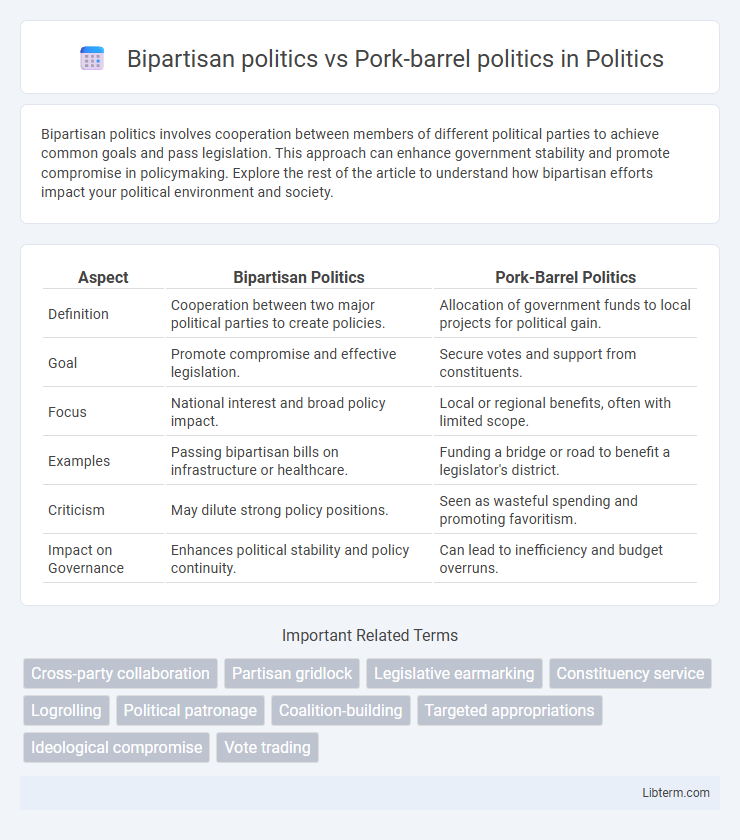Bipartisan politics involves cooperation between members of different political parties to achieve common goals and pass legislation. This approach can enhance government stability and promote compromise in policymaking. Explore the rest of the article to understand how bipartisan efforts impact your political environment and society.
Table of Comparison
| Aspect | Bipartisan Politics | Pork-Barrel Politics |
|---|---|---|
| Definition | Cooperation between two major political parties to create policies. | Allocation of government funds to local projects for political gain. |
| Goal | Promote compromise and effective legislation. | Secure votes and support from constituents. |
| Focus | National interest and broad policy impact. | Local or regional benefits, often with limited scope. |
| Examples | Passing bipartisan bills on infrastructure or healthcare. | Funding a bridge or road to benefit a legislator's district. |
| Criticism | May dilute strong policy positions. | Seen as wasteful spending and promoting favoritism. |
| Impact on Governance | Enhances political stability and policy continuity. | Can lead to inefficiency and budget overruns. |
Understanding Bipartisan Politics: Definition and Principles
Bipartisan politics involves cooperation between members of two major political parties to achieve common goals, emphasizing negotiation, compromise, and mutual respect. It aims to create balanced policies that reflect diverse perspectives, avoiding extreme partisanship or unilateral decision-making. Understanding bipartisan principles highlights the importance of bridging ideological divides to foster effective governance and sustainable legislation.
What is Pork-Barrel Politics? Key Characteristics
Pork-barrel politics refers to the allocation of government funds for local projects designed to please voters or legislators and secure their support, often without regard to broader national interests. Key characteristics include targeted spending on specific districts, emphasis on tangible benefits like infrastructure or community programs, and the use of such projects as political leverage to garner electoral support and maintain power. This approach contrasts with bipartisan politics, which seeks cooperation across party lines to achieve broader legislative goals.
Historical Context: Bipartisanship in Government
Bipartisan politics historically emerged as a mechanism to navigate deeply divided legislatures, promoting collaboration between major political parties to pass significant legislation and stabilize governance. In contrast, pork-barrel politics often reflects localized, interest-driven funding allocations made by legislators to secure electoral support, sometimes undermining broader policy goals. The evolution of bipartisanship in government highlights moments such as the New Deal era and Civil Rights Act, where cross-party cooperation was pivotal despite the persistent presence of pork-barrel tactics that continue to influence legislative behavior.
The Evolution of Pork-Barrel Politics in Modern Times
Pork-barrel politics has evolved into a strategic tool for securing localized government funding through targeted legislative projects, often criticized for fostering inefficiency and political patronage. Unlike bipartisan politics, which emphasizes cross-party collaboration for national policy goals, pork-barrel spending frequently prioritizes parochial interests to gain political support and re-election advantages. Modern trends show an increase in transparency and accountability measures aimed at curbing wasteful expenditures while maintaining the political incentives underlying pork-barrel allocations.
Comparing Bipartisan and Pork-Barrel Approaches
Bipartisan politics emphasizes cooperation between political parties to achieve common legislative goals, promoting policy stability and broad support across diverse constituencies. In contrast, pork-barrel politics prioritizes securing government funds for localized projects, often benefiting specific districts rather than addressing national interests. While bipartisan approaches foster inclusive governance and long-term solutions, pork-barrel tactics may lead to fragmented spending and partisan favoritism.
Benefits of Bipartisan Collaboration in Policymaking
Bipartisan collaboration in policymaking fosters a balanced approach by integrating diverse political perspectives, which enhances the legitimacy and durability of legislation. This cooperation often leads to more comprehensive solutions that address broader constituent needs, promoting social cohesion and economic stability. By transcending partisan divides, bipartisan efforts can accelerate the legislative process and improve public trust in government institutions.
Negative Impacts of Pork-Barrel Spending on Governance
Pork-barrel politics often undermines governance by promoting inefficient allocation of public funds, leading to wasteful projects driven by political favoritism rather than public need. This practice distorts legislative priorities, fostering corruption and eroding public trust in government institutions. In contrast, bipartisan politics aims to create balanced policies that serve broader societal interests, enhancing transparency and accountability.
Case Studies: Bipartisanship vs Pork-Barrel in Action
The 2009 American Recovery and Reinvestment Act exemplifies bipartisanship with both Democrats and Republicans collaborating to stimulate the economy during the Great Recession. In contrast, the 2013 Bridge to Nowhere project highlights pork-barrel politics, where earmarked funding for Alaska's Ketchikan Bridge faced backlash for perceived wasteful spending benefiting a narrow constituency. These cases illustrate how bipartisan cooperation seeks broad public gains, while pork-barrel tactics often prioritize localized interests at the expense of wider fiscal discipline.
Public Perception: Trust in Bipartisan vs Pork-Barrel Politics
Public perception of bipartisan politics often centers on trust and cooperation, as voters tend to view bipartisan efforts as a commitment to finding common ground and addressing broader societal needs. In contrast, pork-barrel politics is frequently perceived as self-serving and wasteful, leading to public skepticism due to the allocation of government funds for localized projects that benefit specific constituencies rather than the general public. Surveys indicate higher levels of skepticism toward pork-barrel spending, eroding trust in government institutions and fostering concerns about corruption and inefficiency.
Future Outlook: Can Bipartisanship Overcome Pork-Barrel Practices?
Bipartisan politics aims to create collaborative policymaking by bridging party divides, potentially reducing the influence of pork-barrel politics that prioritize localized spending for political gain. Emerging trends in governmental transparency, public demand for accountability, and institutional reforms increase the feasibility of bipartisanship weakening pork-barrel practices. However, entrenched interests and electoral incentives continue to challenge the scalability of bipartisan solutions that fully overcome parochial spending behaviors.
Bipartisan politics Infographic

 libterm.com
libterm.com